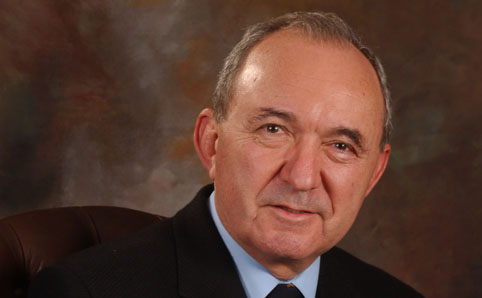Latest News Archive
Please select Category, Year, and then Month to display items
12 January 2024
|
Story Nonsindiswe Qwabe
|
Photo Sonia Small
 Since joining the UFS in 2008, Dr Grey Magaiza has worked extensively on approaches that can foster the socio-economic transformation of societies.
Since joining the UFS in 2008, Dr Grey Magaiza has worked extensively on approaches that can foster the socio-economic transformation of societies.
“The future should be one where communities can decide on their development agenda and futures. That’s the most important for me.” Dr Grey Magaiza, Deputy Director of the Centre for Gender and Africa Studies (CGAS) and Head of the Community Development programme on the Qwaqwa Campus, is passionate about capacitating communities to be agents of change and advancement. His vision for the future emphasises the empowerment of communities to take charge of their development by actively participating in decision making and the implementation of development projects that can improve their lives.
Since joining the UFS in 2008, Dr Magaiza has worked extensively on approaches that can foster the socio-economic transformation of societies. Over the years, he has crafted his research speciality into one that he is most proud of – being an interdisciplinary scientist immersed in the development of communities.
“I’m in a fortunate position of researching what I like. I say ‘fortunate’, because I’ve taken the time to understand what I’m passionate about, which is the overall field of rural livelihoods and livelihood futures – in short, community development. My research starts from an engaged university, understanding the elements that a university must use to enhance transformation and relevance to its immediate community in terms of development.”
One of the ways he has done this is by looking at social entrepreneurship as a development approach for young people in a rural setting. Through workshops with non-profit and civic organisations in Qwaqwa, Dr Magaiza has been helping these organisations to map out their needs and actively meet them through the involvement and support of external role players.
“We understand that communities are part of the national development agenda, but even that national agenda respects community knowledge and intentions and allows communities to shape their identity. A critical enabler of this is community organising. You bring back the capacity in communities to have dialogues on issues affecting them as spaces for engagement, knowledge exchange, and for people to just talk about their way forward.”
By enabling communities to define their development agenda, they can address their specific needs, challenges, and aspirations, he said. “When I look at livelihood futures, it’s quite an exciting aspect of my work – it’s like looking into a fortune tellers’ globe, because you’re not deciding for communities what they should do, but the communities themselves take those decisions.”
UFS awards honorary degree to Justice Richard Goldstone
2012-01-26
 |
| Justice Richard Goldstone |
A huge honour will be bestowed upon the University of the Free State (UFS) when the world renowned Justice Richard Goldstone will be receiving an honorary degree at the official opening of our university.
The Doctor of Laws (honoris causa) degree will be conferred on Justice Goldstone on Friday 3 February 2012 at 10:00 on our Bloemfontein Campus.
Mr Richard Freedman, Director of the South African Holocaust and Genocide Foundation, and Judge Mahube Molemela, Justice of the Free State High Court, are amongst the prominent figures expected to attend this event.
Justice Goldstone served in the Constitutional Court from 1995 to 2003. Prior to that, he was a judge of the High Court and from 1989 a judge of the Supreme Court of Appeal. From 1994 to 1996 he was the first Chief Prosecutor of the United Nations Criminal Tribunals for the former Yugoslavia and Rwanda. He is presently a Senior Fellow at the Jackson Institute at Yale University in the United States. Over the past 18 years he has become a leading expert on international criminal law.
Prof. Neels Swanepoel, Head of the Department of Law of Procedure and Law of Evidence, said the faculty is proud to honour Judge Richard Goldstone for his outstanding legal career and in particular for his contribution to the development of international criminal justice.
“As Chief Prosecutor for both the International Criminal Tribunal for the former Yugoslavia (ICTY) as well as the International Criminal Tribunal for Rwanda (ICTR), he has contributed to precedent-setting judgments on genocide, war crimes and crimes against humanity. His publications on various aspects of International Criminal Justice have contributed towards the stage where those bearing the greatest responsibility for human and humanitarian rights violations, will face justice.”
Prof. Swanepoel says judge Goldstone has contributed towards laying the foundations for conflict resolution in societies that have transformed from repressive to democratic rule and to what is now referred to as ‘transitional justice’.
On Thursday 2 February 2012 at 19:00, Judge Goldstone will deliver a Prestige Lecture on ‘The Future of International Criminal Justice’ in the Auditorium of the C.R Swart Building on the UFS Bloemfontein Campus.
Media Release
26 January 2012
Issued by: Lacea Loader
Director: Strategic Communication
Tel: 051 401 2584
Cell: 083 645 2454
E-mail: news@ufs.ac.za